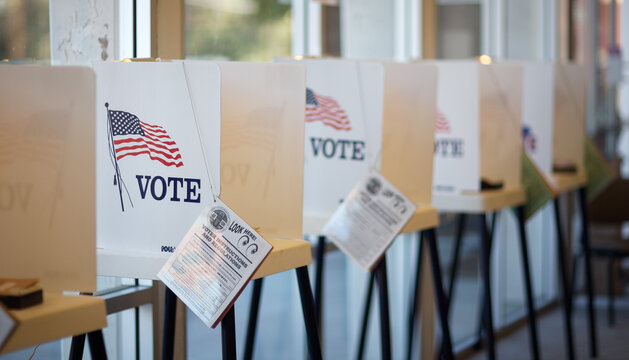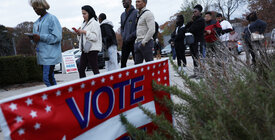Noteworthy Legislative Trends
Across these legislative categories, the following trends have emerged so far this year.
Weakening Avenues for Direct Democracy
Arkansas, North Dakota, and Ohio approved legislation that would make it harder for citizens to initiate or pass ballot measures. A law passed in Arkansas raises the number of counties where registered voters must file an initiative petition from 15 to 50, making it harder for an initiative to reach the general ballot. A resolution passed by the North Dakota legislature would increase the number of signatures required for a citizen-led initiative for a constitutional amendment to appear on the ballot from 4 percent to 5 percent of the state’s resident population. The resolution would also require that such ballot measures be approved by a majority of voters in both a primary and general election in order to be implemented. Currently, voters need only approve a ballot measure by a simple majority in one election. Voters will have to approve the measure during the November 2024 election to be effective.
In Ohio, the state legislature passed OH S.J.R. 2, which could increase the approval threshold needed to pass a constitutional ballot measure from a simple majority to 60 percent. Voters will have to approve the measure before it can be implemented. The Ohio legislature — which passed legislation earlier this session banning August elections because of low turnout — scheduled a special election on the measure this August. At a moment when reproductive justice advocates are engaging the ballot initiative process to enshrine the right to an abortion in Ohio’s constitution, the resolution appears designed to undermine those efforts.
Ballot measures provide voters the opportunity to directly shape state law and policy. If approved by voters, these two measures will curtail a critical method of democratic policymaking. The measures continue a trend from the past few years in which state legislatures have attempted to restrict or undermine the ballot initiative process. In 2020, Florida raised the number of signatures required for an initiative petition to reach the general ballot from 10 percent to 25 percent. In 2022, Arizona voters approved a constitutional amendment passed by the legislature to raise the voter approval threshold for ballot initiatives that raise taxes from a simple majority to 60 percent.
Criminalizing Election-Related Activities
This year we’ve seen an increased focus in state legislatures on criminalizing election-related activities. Fueled by false claims of widespread voter fraud, a variety of bills would empower law enforcement to penalize voters, election officials, and volunteers for ordinary conduct and inadvertent errors.
In Texas, two bills that were passed by the state senate but are now dead would have removed the requirement that a prosecutor must prove that a person knew they were ineligible to vote for them to be guilty of illegal voting. This would have made it easier to prosecute individuals for honest mistakes about their eligibility to vote, which risks intimidating eligible voters. The Texas house rejected this approach.
Some state legislatures have also moved to criminalize ordinary voter mobilization activity, although most attempts to do so failed to become law. Florida enacted a law that will drastically increase the financial penalties on voter registration organizations for human errors and impose a $50,000 fine on the organization if a person who is not a citizen collects voter registration forms on its behalf. Wyoming’s governor vetoed a bill that would have prohibited anyone except an election official from sending out an unsolicited mail ballot application, while Arkansas enacted a law that makes it a crime for an election official to send out an unsolicited mail ballot application or mail ballot. And an Arizona bill that would have made it a felony to deliver a mail ballot without following the proper identification procedure was passed by the state senate but failed in the house.
This trend of proposing legislation that criminalizes election-related activity creates an atmosphere of fear around elections and can discourage participation by voters, election officials, and volunteers. At the same time, some state legislatures are politicizing law enforcement’s authority over election matters.
Florida and Texas have moved to expand the power of prosecutors to go after low-level election crimes — and circumvent the discretion of local prosecutors who decline to bring charges, often when the evidence indicates a lack of criminal intent. As noted above, Florida enacted a law that expands the authority of statewide prosecutors so they can continue the prosecutions of individuals for honest mistakes that the state’s election police have claimed are voter fraud. And the Texas senate passed a bill, now dead, that would have authorized county and district attorneys to prosecute election offenses in adjoining counties or districts if that county’s attorneys declined to do so. The Texas senate also approved a bill, now dead, that would have empowered the secretary of state to appoint “election marshals” tasked with investigating illegal voting and filing criminal charges. This kind of legislation echoes laws enacted in Florida and Georgia in 2022.
In a related trend, lawmakers in at least five other states have taken steps to create “election police” units. For example, Arkansas enacted a law that creates an “election integrity unit” in the attorney general’s office tasked with investigating violations of election law and referring them for prosecution. At least four additional states introduced legislation this year to create similar units. However, we do not classify this legislation as election interference, as it does not inappropriately transfer investigative or prosecutorial authority to political branches of government.
Texas Legislature’s Targeting of Harris County
Texas legislators introduced several bills this year that target election administration in Harris County (home to Houston), which is the third largest county in the country and has the greatest number of nonwhite eligible voters in the state. Such selective backlash against a single county is unusual, but in Texas, it’s not novel.
The most blatant example of interference is a bill that would authorize the secretary of state, a political appointee, to exercise extreme, indefinite oversight over the day-to-day activities of Harris County elections, including a requirement that the county official obtain the secretary of state’s approval of all policies and procedures. That bill has passed both chambers of the legislature and is awaiting the governor’s signature. It originally would have applied to all counties, but in the last few days of the legislative session, it was amended to target Harris County alone. Such oversight could be triggered by unintentional errors in election administration.
A similar bill, which died with the end of Texas’s legislative session, would have allowed the secretary of state to call for a new election in a county with a population of 2.7 million or higher if the secretary had good cause to believe that at least 2 percent of polling places ran out of usable ballots and did not receive supplemental ballots for one or more hours after requesting them — targeting the pattern of facts that took place in Harris County during the 2022 general election. This bill would have empowered a partisan official to outright dismiss election results on the basis of technical difficulties.
The Texas legislature has focused on Harris County before. During the 2020 general election, the county’s elections administrator implemented innovative policies, including drive-thru voting and 24-hour voting, to give voters flexible, safe ways to cast their ballots during the pandemic. Additionally, the administrator had planned to send out mail ballot applications to all voters but was warned not to do so by the secretary of state. The Texas legislature responded in 2021 with the passage of S.B. 1, a restrictive voting bill that, among other things, prohibits drive-thru and 24-hour voting and criminalizes election officials who send out unsolicited mail ballots. Now the state legislature has provided the secretary of state the authority to intervene in Harris County’s elections in response to administrative complaints, in an apparent backlash to the county’s innovative voting policies and unintentional election errors.
In fact, the backlash against the Harris County elections administrator is likely to go even further when the governor signs an additional bill passed by both chambers of the legislature that would eliminate the position altogether. While we do not categorize the bill as interference because it leaves election administration in the hands of other elected county officials, the bill would take the unprecedented step of denying this single county the authority to decide for itself whether its elections are operated by an election administrator or by the county clerk and assessor. Every other Texas county can make its own determination about which form of election administration it prefers. Additionally, the bill would effectively oust the election administrator two months before a local election this November.
Legal Protections for Election Workers
Existing federal and state laws protect voters from intimidation, but state laws have generally not addressed intimidation against election workers. According to Brennan Center research, in recent years, election officials have received death threats and online harassment, partisan interference with their jobs, and have been subjected to the risk of criminal prosecution for minor infractions imposed by new laws.
This year, several legislatures have proposed and passed legislation to counteract threats against election workers. At least five laws passed in Arkansas, Minnesota, New Mexico, North Dakota, and Oklahoma will prohibit anyone from intimidating election workers or interfering with their duties. At least three similar bills are still moving through two other state legislatures.



